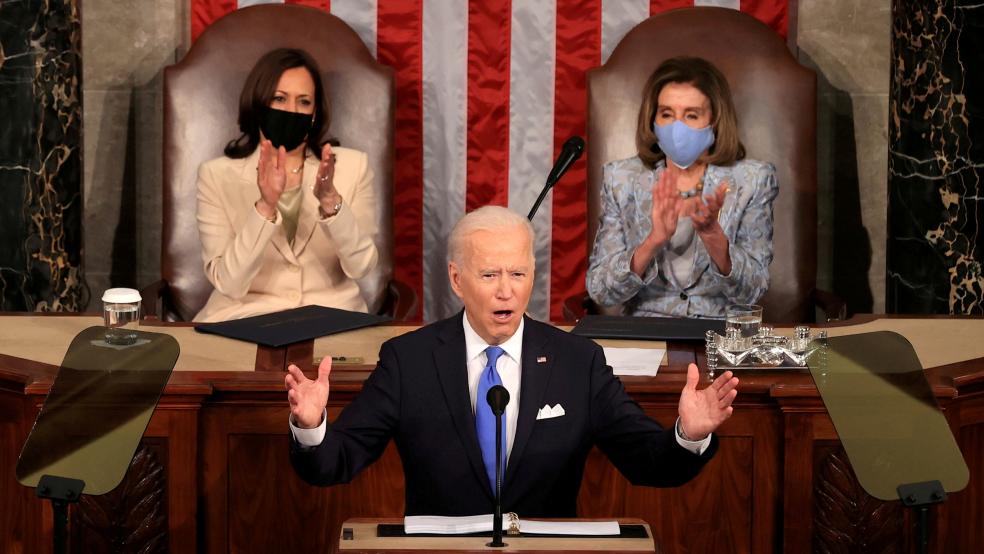President Biden’s rollout this week of his $1.8 trillion American Families Plan has resulted in a flood of analysis and commentary befitting the size of the proposals. Here, a selection of key responses and takeaways.
This is what the U.S. needs: Biden proposed “what amounts to a revision of America’s social contract, giving the country something closer to the social safety net that most of the world’s advanced democracies have,” The Washington Post’s David Ignatius writes. “The cost is enormous. … But it’s the right thing to do. For a generation, the unfair distribution of rewards in the American economy has been our glaring weakness. It crushed the middle class and fueled the bizarro billionaire populist crusade of Donald Trump, who nearly wrecked our politics. Changing the formula so that rich people get less and everybody else gets more will be hard, but it’s necessary.”
“Biden’s intentions are admirable,” Bloomberg’s Editorial Board says. He’s right to prioritize opportunity for the poor and disadvantaged — a consistent theme. He’s also right to match long-term spending increases with plans to raise taxes, because most of these outlays, however desirable, won’t pay for themselves. And it makes sense, as Biden proposes, to target those best able to afford it, hence pushing back against the trend of worsening economic inequality.”
Biden is proposing the biggest government expansion in decades: “Biden’s multi-trillion dollar spending splurge would be the biggest federal investment in the middle and lower classes since President Lyndon B. Johnson’s Great Society, with the potential to alter the country for generations,” Time’s Alana Abramson and Brian Bennett say.
The Trump presidency, and how it changed the Republican Party, paved the way for this: “Biden is making a $5 trillion bet,” Abramson and Bennett add. “The president has calculated, aides and allies say, that the twin shocks of the last four years—President Donald Trump’s gutting of the federal government and the historic pandemic—have created a once-in a career opportunity. By embracing a pre-Reagan vision of expansive government that delivers for a hurting nation, he hopes to capitalize on the post-Trump political moment.”
It's not just Trump, but the Republican grassroots that have changed. “A decade after Republicans responded to Barack Obama’s election by launching the tea party and warning of the evils of overzealous government, there is so far no similarly fervent pushback in the electorate today,” The Washington Post’s Aaron Blake writes. “Indeed, about a quarter-century after a Democratic president declared that ‘the era of big government is over,’ the new Democratic president comes into office with the electorate more in favor of big government than at any point in recent history.”
As did changing views of deficits and debt: “President Barack Obama operated in a world in which deficits mattered politically. Biden doesn’t,” Washington Post columnist Megan McArdle notes. “Between the unfunded Trump tax cuts and a year of hog-wild pandemic spending, politicians have largely given up even pretending that they ought to pay for things their constituents want; it’s no longer even a good cudgel with which to beat the opposition when you’re out of power.”
But there are risks to Biden’s plans: “Spending on such a scale without waste is a bigger challenge than the president appears to think,” Bloomberg’s Editorial Board adds. “And when it comes to taxes, the promise that the richest 0.3% will pay for everything is implausible bordering on dishonest. The danger is that the gains for the intended beneficiaries will be less than hoped, and the substantial cost won’t in the end be confined to a sliver of people at the top.”
Biden’s proposals to pay for his plans raise lots of questions: For example, the administration estimates that its revenue-raising proposals would take 15 years to cover the $1.8 trillion cost of 10 years’ worth of additional spending and tax breaks for child care, education, health care and other programs. The divergence from the traditional 10-year timeframe used in budget accounting has drawn some pushback from budget watchdogs and some wonks. “The administration has already proposed to jack up taxes on corporations and the richest Americans,” McArdle says, “and it still comes up short on paying for its proposals within the normal [10-year budget] window.”
But the key question may be what we’d get for the money: “Promises to spend half a trillion here and half a trillion there suggest the outlay is itself the purpose — the bigger, the better — when the goal ought to be what the spending will buy, preferably at least cost,” the Bloomberg Editorial Board argues. “Done right, spending on infrastructure can boost private investment and growth; done wrong, it builds bridges to nowhere. Universal access to broadband internet is eminently desirable; it might be achieved economically and efficiently, or at inordinate cost. Two years of tuition-free community college could mean expanded training in skills demanded by employers, hence higher incomes and faster growth; or it could cause delayed entry into the labor force with loss of wages and no offsetting benefit.”
So for Biden’s big bet on big government to really work, he has to show that the government can deliver results.
If Biden succeeds, Republicans will be in trouble: “If the main elements in Joe Biden’s American Family Plan become law, they’ll be very hard to repeal. Why? Because they’ll deliver huge, indeed transformational benefits to millions,” writes New York Times columnist Paul Krugman. “I mean, just imagine trying to take away affordable child care, universal pre-K and paid leave for new parents once they’ve become part of the fabric of our society. You’d face a backlash far worse than the one that followed Republican attempts to eliminate protection for coverage of pre-existing health conditions in 2017.”





